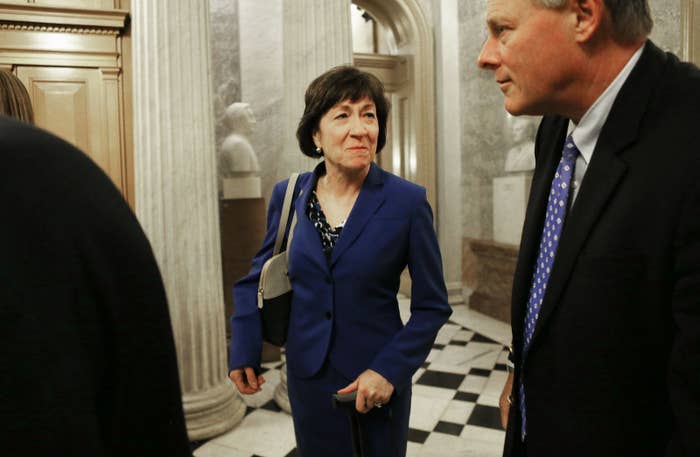
The Republicans’ Hail Mary attempt to repeal Obamacare without Democratic support appears to be doomed once again.
Arizona Sen. John McCain announced Friday he will not support the Graham-Cassidy repeal bill, followed by Maine Sen. Susan Collins on Monday.
Along with Collins and McCain, Kentucky Sen. Rand Paul has repeatedly declared he will vote against the bill. Those three would be enough to kill the bill on their own, but Sen. Lisa Murkowski of Alaska, who opposed the last repeal bill in July, is also a likely no vote. And Texas Sen. Ted Cruz said Sunday that "right now, they don't have my vote" on the bill, though he added: "I want to be a yes."
Collins cited cuts to Medicaid and fears about higher premiums and weakened protections for people with pre-existing conditions as the reasons for her opposition to the bill.
Collins called the bill "deeply flawed" and said that sweeping changes to the American health care system can't be done well in such a compressed time frame. She also said she hoped that bipartisan negotiations in the Senate to stabilize Obamacare and "fix the very real flaws" in the law — which had been put on hold — would resume.
As he did in July, McCain indicated he was voting against the bill because of the broken process. The bill was introduced only last week and set to be voted on before the end of the month with no full analysis of its effects from the nonpartisan Congressional Budget Office and only one committee hearing to study it.
“As I have repeatedly stressed, health care reform legislation ought to be the product of regular order in the Senate,” McCain said in a statement.
“We should not be content to pass health care legislation on a party-line basis, as Democrats did when they rammed Obamacare through Congress in 2009. If we do so, our success could be as short-lived as theirs when the political winds shift, as they regularly do.”
McCain statement opposing Graham-Cassidy: "I take no pleasure in announcing my opposition. Far from it."
Republicans have only until Sept. 30 to use the special budget reconciliation process that allows them to pass an Obamacare repeal bill with just 50 votes. After that, Republicans would need 60 votes — which would include at least eight Democrats — to pass the bill through the Senate, or they'll have to start over completely.
Majority Leader Mitch McConnell had wanted to hold a vote on the bill crafted by Republican Sens. Bill Cassidy and Lindsey Graham next week in order to beat that deadline. It's unclear if Republicans will move forward with a vote following McCain's announcement.
The Graham-Cassidy plan would repeal Obamacare’s subsidies and Medicaid expansion and turn them into block grants to the states with few strings attached. States would then be tasked with coming up with their own health insurance systems.
The bill has come under a barrage of criticisms from health groups and even the insurance industry over fears that it would open the door to discrimination against people with preexisting health conditions. It also sparked a memorable rant by comedian Jimmy Kimmel, who accused Cassidy of lying about wanting to protect families. (After Kimmel shared a story on his late-night show about his infant son's heart problems and argued that all families should be able to afford such care, Cassidy had begun pitching his plan as passing "the Jimmy Kimmel test.")
Thank you @SenJohnMcCain for being a hero again and again and now AGAIN
In a series of tweets on Friday, Graham said that he "respectfully disagrees" with longtime friend McCain and that he and the bill's other sponsors will "press on." (Graham added that his friendship with McCain "is not based on how he votes but respect for how he’s lived his life and the person he is.")
"Taking money/power out of Washington & returning it to states to administer HC is the best way to replace a collapsing Obamacare system," Graham wrote.
The big question is what will happen to the Obamacare markets if the Republican efforts to repeal the law do in fact fail. The Senate Health Committee had been working on a bipartisan bill to stabilize the markets and was close to a deal. But days ago committee chairman Sen. Lamar Alexander called off the negotiations, saying that despite making progress with Democrats, there was not enough support for a bipartisan bill. This came after Speaker of the House Paul Ryan told Senate leadership he would refuse to put a bipartisan stabilization bill to a vote on the floor of the House.
Sen. Patty Murray, the lead Democrat who had been negotiating with Alexander, praised McCain's decision to oppose Graham-Cassidy on Friday, saying she is "ready to keep working" now that Republican attempts to repeal Obamacare appear to be dead once again.
"I remain confident that we can reach a bipartisan agreement as soon as this latest partisan approach by Republican leaders is finally set aside," Murray said in a statement.
Collins also said Monday night that she hoped Alexander and Murray could "resume" the talks.
"We were making great progress on what I hoped would be the first in a series of bills to fix the very real flaws that do exist in the ACA and we've held four very substantive hearings, very meaty hearings. ... So I would hope that that work would be resumed very quickly and that we could then go on to other issues in the ACA," Collins told reporters.
Emma Loop contributed to this story.
UPDATE
This article was updated to include Sen. Ted Cruz's statement that he currently opposes the health care bill.
UPDATE
This article was updated to include Sen. Susan Collins officially announcing her opposition to the health care bill.

